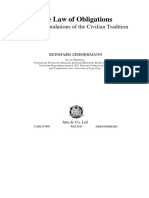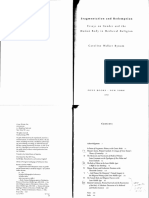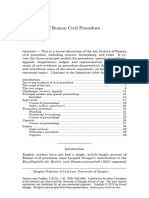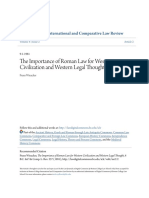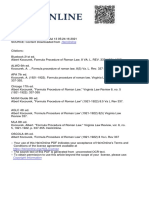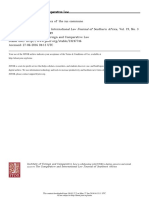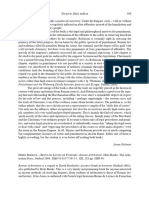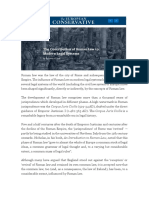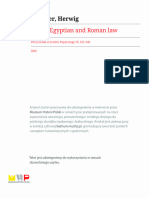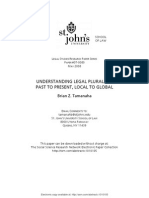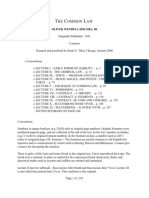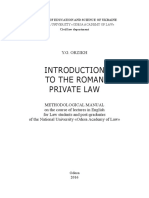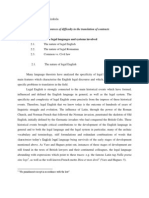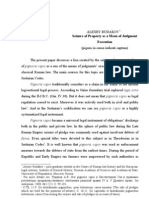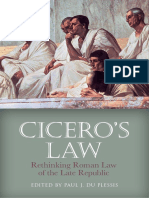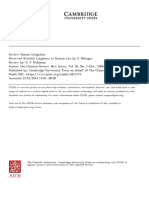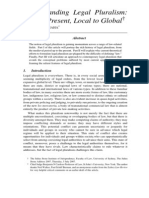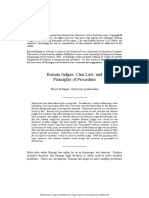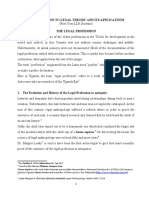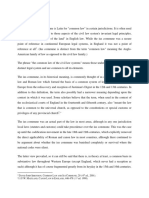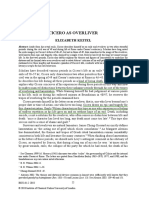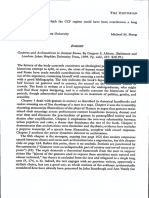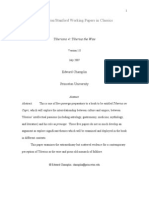Roman Law and Rhetoric
Roman Law and Rhetoric
Uploaded by
Florencia GabrielaCopyright:
Available Formats
Roman Law and Rhetoric
Roman Law and Rhetoric
Uploaded by
Florencia GabrielaOriginal Description:
Copyright
Available Formats
Share this document
Did you find this document useful?
Is this content inappropriate?
Copyright:
Available Formats
Roman Law and Rhetoric
Roman Law and Rhetoric
Uploaded by
Florencia GabrielaCopyright:
Available Formats
O.
Tellegen
Roman Law and Rhetoric
In: Revue belge de philologie et d'histoire. Tome 84 fasc. 1, 2006. Antiquit - Oudheid. pp. 59-75.
Citer ce document / Cite this document :
Tellegen O. Roman Law and Rhetoric. In: Revue belge de philologie et d'histoire. Tome 84 fasc. 1, 2006. Antiquit - Oudheid.
pp. 59-75.
doi : 10.3406/rbph.2006.5006
http://www.persee.fr/web/revues/home/prescript/article/rbph_0035-0818_2006_num_84_1_5006
Roman Law and Rhetoric
Olga Tellegen-Couperus
1. Introduction
In his book on the art of rhetoric in the Roman world, George Kennedy
states that, in Greek rhetoric, the judicial oratory had a position of leadership,
and he assumes that this was also the case in Rome(1). Consequently, he dedi
cates a much larger number of pages to judicial oratory (1 1) in early Roman
rhetoric than to deliberative (4) and epideictic oratory (2).
He begins by stating that the formulary procedure was the most char
acteristic
feature of Roman procedure(2). I quote: 'The magistrate before whom
a case was initiated, usually a praetor, drew up a precisely worded formula
or legal definition of the wrong alleged ("if so and so proves to be the case,
then let the defendant be condemned") and referred the case to a court whose
function then became to decide whether or not the conditions of the formula
were fulfilled.' However, according to Kennedy, the formulary procedure did
not encourage elaborate speech-making, and he hardly refers to it again in this
chapter. As for the patrons or professional orators who pleaded other people's
cases: they determined the tactics and procedure of the case and, most im
portant
of all, its rhetorical presentation, but for technical legal advice, they
depended on jurisconsults, professional legal authorities(3). In this description,
Kennedy minimises the role of oratory in the formulary procedure, although
that was the most important legal procedure in the later Roman republic and
the early empire. Therefore, he undermines his own statement about the re
levance
of judicial oratory in Rome(4).
The reason why Kennedy minimises the role of oratory in the fo
rmulary
procedure cannot be found in the sources but in the modern romanist literature to which he refers(5). For two centuries or more, Romanists (i.e.,
modern jurists studying ancient Roman law) have regarded law as an autono
mousconcept linked with the truth, and rhetoric as a way of escaping from,
(1) Cf. G. Kennedy, The Art of Rhetoric in the Roman World, Princeton, 1972, p. 7.
(2) G. Kennedy, 1972, p. 9.
(3) G.Kennedy, 1972, p. 14.
(4) In the same vein, for instance, P. Gerbrandy in his recent Dutch translation of Quintilian's Institutio oratoria: De opleiding tot redenaar, Groningen, 2000, p. 17. In his .4 New
History of Classical Rhetoric, Princeton 1994, p. 115, Kennedy is more positive: 'Roman law
was heavily dependent on precedent and what an orator successfully argued in a particular
case could influence the development of the law.' However, he gives no further explanation.
(5) Of the books mentioned by G. Kennedy, 1972, p. 9, note 9, the most influential still
is the one by F. Schulz, History of Roman Legal Science, Oxford, 1946. See, in this work,
particularly, p. 50-55.
60
OLGATELLEGEN-COUPERUS
perverting, and concealing the truth. Following Plato, they think that jurists
always try to find the absolute truth about law, whereas orators only go for
probabilities by means of argumentation^'. They also applied this view to the
two parts of the formulary procedure, in the following way. In the first part,
which took place before the praetor, the formula had to be worded. This was an
extremely technical process, which was dominated by the jurists. In the second
part of the formulary procedure, which took place before the judge, the unus
index, only the facts mentioned in the formula were at stake; it was dominated
by the patrons or orators who would try with all means including lies, slander,
and emotional appeals to win their client's case. Therefore, in this view, only
the first part of the procedure was important for the development of Roman
law, and the role of oratory was hardly relevant at all.
To discuss the pros and cons of this view is beyond the scope of this
paper*7). What I want to do here is point out that the sources provide us with
much more complicated information about the role of the patrons in the fo
rmulary
procedure. They show that the patrons were active in the first part of
this procedure, particularly in the drawing up of the formula. Moreover, they
show that, in their speeches before the judge, the patrons did not plead about
facts only, but about the juridical interpretation of facts or words. In the light
of these sources, therefore, it seems that the patrons did contribute to the de
velopment
of Roman law. In this paper, I would like to assess the significance
of these sources for the relevance of rhetoric in the formulary procedure.
Because Kennedy discusses judicial oratory according to its different
aspects and not according to the different procedures, this chapter is some
times rather confusing. Therefore, in order to make my point, I will first have
to put this procedure in its proper context; I will give a general outline of the
procedures that were used for civil and criminal cases, and assess what the role
of rhetoric in these procedures was. Then I will concentrate on the formulary
procedure, discuss the different parts, and show with the help of examples
from Cicero and Justinian's Digest that patrons played a vital role in the first
and the second part of this procedure and therefore also in the development of
Roman law. I hope it will then be clear that, in Rome, judicial oratory was as
important in the formulary procedure as in the other procedures.
(6) Already in Antiquity, Plato's belief in absolute truth was controversial, but in the Midd
leAges, it became popular again. Rhetoric has been taken seriously again only recently. Cf.
. VicKERS, In Defence of Rhetoric, 2nd edition, Oxford, 1990.
(7) In recent years, there has been a tendency to modify this traditional view. See J.A.
Crook, Legal Advocacy in the Roman World, London, 1995. In the same vein, J.W. Tellegen
and O.E. Tellegen-Couperus, Law and Rhetoric in the causa Curiana, in Orbis Iuris Romani,
Journal ofAncient Law Studies, 6, 2000, p. 171-203.
ROMAN LAWAND RHETORIC
61
2. Legal procedures and the role of rhetoric
The oldest procedure for civil law cases was the trial by means of legis actiones (literally, actions based on the law)(8). It was conducted orally and was
divided into two phases: the first before the, pontifex who decided whether the
litigants could take legal action, the second before a judge who was a private
citizen and who, after hearing evidence, pronounced his judgment. In early
Rome, this evidence was often obtained with the help of irrational, supernatur
al
methods such as ordeal or the taking of auspicia by observing the flight of
birds. The legis actio procedure was very formal, strictly Roman, and allowed
litigation for a small number of legal problems only. In the third century BC, it
was somewhat modernised, one of the changes being that a court of one hun
dred judges, the centumviri, was introduced to decide on claims concerning
large inheritances and possibly also on disputes about the ownership of land
and about guardianship. Emperor Augustus allowed the centumviri to continue
even after 1 7 BC when he abolished the legis actiones as the regular proce
dure. In the 2nd century AD, they were replaced by the imperial courts.
Around 200 BC, a new way of civil litigation was created, the formulary
procedure, which came to function side by side with the legis actiones. It also
consisted of two phases, but was much less formal. The first phase took place
before a pontiff or, by the end of the second century BC, before a magistrate,
usually the praetor. It differed from the legis actiones in that the litigant parties
no longer had to pronounce their claims orally but put them down in a written
formula, and also in that litigation was no longer limited to a fixed number of
legal problems. It was the praetor who decided whether a judge should be ap
pointed
to decide on a particular problem. The bulk of Roman private law has
been created in this context, in the last two centuries of the republic; then, there
was a formula for every case that could be brought to court. At the same time,
legal experts had collected judgments and opinions on the interpretation of the
formulas, and they continued to do so in the first two centuries of the empire.
In the course of the 2nd century, the formulary procedure went out of use and
the imperial courts took over.
We know very little about the way criminal cases were tried in the early re
public.
We do know that a distinction was made between serious offences that
were regarded as harmful to the state (treason, murder) and lighter offences
that were regarded as harmful to the individual citizen only (theft, defamation
of character). For an offence of this second category, the injured party himself
had to institute a civil procedure, i.e., at first by means of a legis actio and
later per formulas . For an offence of the first category, every citizen was able
to sue the perpetrator. There are various interpretations and reconstructions of
the way in which these crimes were dealt with. According to Mommsen and
Jones, the proceedings took place in the presence of a magistrate, and anyone
who was condemned to death by him could appeal to the popular assembly(9).
(8) For the civil procedures, see M. Kaser-K. Hackl, Das rmische Zivilprozessrecht, 2nd
edition, Mnchen, 1996.
(9) Th. Mommsen, Rmisches Staatsrecht, 3rd edition, Leipzig, 1887 (rpt. Graz 1952),
p. 163-164, and Id., Rmisches Strafrecht, Leipzig, 1899 (rpt. Graz 1955 and Darmstadt
62
OLGATELLEGEN-COUPERUS
This view has been challenged in various ways. The most recent view is that
of Santalucia, who maintains that only the popular assembly (in this case, the
comitia centuriata) had the authority to condemn a person to death after he had
been found guilty by a magistrate(10).
We are much better informed about the new criminal courts which were
introduced for serious crimes in the 2nd century BC. Initially, these courts
were appointed occasionally, but in 149 BC, the lex Calpurnia established the
first court for a particular type of offence, namely the quaestio de repetundis;
its task was to deal with cases of extortion by Roman governors in Italy or the
provinces. A specially appointed praetor was in charge of the proceedings. In
the following fifty years, other quaestiones perpetuae were established: for
murder and poisoning, for forgery of wills and other documents, for high trea
son, for bribery during elections, and for embezzlement of public funds. As
from 100 BC, new magistrates {tresviri capitales) were appointed to deal with
less serious crimes committed by slaves, foreigners and possibly also Roman
citizens from the lower social strata.
We know something about the procedure in these quaestiones because
some of the speeches made by Cicero when he acted as advocate or prosecutor
in such lawsuits have survived. Every respectable citizen, not only the injured
party, could lodge a complaint against someone. If the praetor allowed the
complaint, a jury was set up by drawing lots. The course of the lawsuit was de
termined
by the parties and their advocates. The plaintiff had to prove that the
defendant had committed the alleged crime. If he was unsuccessful he ran the
risk of being accused himself because he had knowingly lodged a false comp
laint. If he was successful he received a considerable reward; for instance, if
the defendant was sentenced to death and his property was confiscated, then
the accusor was entitled to a share of this property. It is not really surprising
that in time the system was abused and some people even made a profession
of accusing rich fellow-citizens. These people became known as delatores.
The defendant, on the other hand, had to prove that he was innocent. Finally, it
was the jury who decided whether the accused was guilty or not and what the
penalty would be, if it was not evident from the law.
Like the formulary procedure, the quaestiones perpetuae continued to exist
in the early empire, but as from the time of Augustus, their work was first sup
plemented
and soon taken over by the new criminal court of the emperor and
his delegates. By the year 200, all quaestiones perpetuae had disappeared.
These new courts of Emperor Augustus were not introduced as such in
Rome, but they originated in those provinces that, in 27 BC, had come di
rectly
under his control. There, the administration of justice was delegated
to officials in the emperor's service. In the course of the 1st and 2nd centuries,
this example was followed in the senatorial provinces, then also in Italy and
finally in Rome. A characteristic of this imperial administration of justice,
commonly called cognitio extraordinaria, was that the trial consisted of one
phase only and that judgment was given by the emperor or by an official act1961), p. 56-57. A.H.M Jones, The Criminal Courts of the Roman Republic and Principate,
Oxford, 1972, p. 1-39.
(10) B. Santalucia, Diritto e processo penale nell'antica Roma, Milano, 1989, p. 31-89.
ROMAN LAWAND RHETORIC
63
ing on behalf of the emperor. The disputes that were settled by means of the
cognition procedure could be very different in nature: not only could they be
about matters concerning private law and criminal law, but they could also be
disputes between citizens and government officials. Another difference is that
the judge now played a much more active role; he could, for instance, conduct
investigations on his own initiative and by any means at his disposal. Although
this new system may have worked for the common Roman citizens, it was not
acceptable for the senators: therefore, Emperor Tiberius allowed the senate to
develop into aforumprivilegiatum for crimes committed by persons from their
own class.
What was the role of rhetoric in all these different courts and procedures? It
will be clear that, in the primitive legis actio procedure, there was no room for
rhetoric. It was only after the procedure had been modernized and the special
court of the centumviri had been established that the art of oratory became
useful in this type of procedure. The oldest and at the same time most famous
example of such a trial is that of the causa Curiana which took place in about
92 BC. Cicero mentions it in several of his rhetorical works because of the ex
emplary
pleas of the advocates, L. Licinius Crassus and Q. Mucius Scaevola,
interpreting the testament in question according to the intent and the letter,
respectively. In the criminal proceedings before the popular assembly, it may
have been relevant for a person to be able to persuade the audience, but so little
is known about this trial that it is impossible to draw conclusions with regard
to rhetoric.
In the second century BC, two new procedures were established: the formul
ary
procedure for civil law cases and the quaestiones perpetuae for criminal
cases. It is obvious that the newly introduced art of rhetoric was useful when
a Roman governor was sued for extortion by the inhabitants of his former
province. Cicero's speech against Verres may be the most famous proof of
the importance of rhetoric for such criminal law trials. In the other cases that
were tried in a quaestio perptua, members of the upper classes were typical
plaintiffs and defendants; it was essential for them to be able to speak well in
public. I will deal with the relevance of rhetoric for the formulary procedure
in the next section.
It is difficult to tell whether the cognitio extraordinaria offered possibilities
for orators to show their talents, because most of the examples of or refer
ences to speeches that we have from the early empire were held in the oldfashioned courts of the centumviri and the quaestiones perpetuae, and in the
senate. However, we know from the works of Tacitus, Fronto, Aulus Gellius,
and others that, in this time, legal advocacy was booming. According to Parks,
the very fact that free political oratory was suppressed by the imperial system
meant that free oratory flourished the more in the forensic context, where the
emperors were less likely to impede it(11). Therefore, the art of rhetoric must
have been practised in the imperial courts as well.
(11) E.P. Parks, The Roman Rhetorical Schools as a Preparation for the Courts under the
Early Empire (John Hopkins University Studies in Historical and Political Science Ser. LXIII,
no. 2), Baltimore, 1945, Ch. II.
64
OLGATELLEGEN-COUPERUS
3. Rhetoric in the formulary procedure
Kennedy, and many authors with him, thinks that, in the formulary proce
dure, only the second phase, before the judge, was relevant for rhetoric. It is
usually assumed that the only thing advocates did was to plead their client's
case before the judge. However, in my view, the advocates were involved in the
first part of the procedure as well. Therefore I will begin with what happened
before the praetor and try to demonstrate with the help of a number of passages
in Cicero that the advocates had to use their knowledge of rhetoric (and law,
for that matter) from the very start of the trial. Then I will discuss the second
part of the trial, before the judge, and try to show that rhetoric was very import
ant
not only for the advocates to help win their cases, but also, in general, for
the development of Roman law.
a. The advocates before the praetor
According to the modern books on Roman law, the procedure by formula
began when the parties that had a dispute put their problem to the praetor (or,
in certain cases, to the aedile) requesting him to appoint a judge to settle their
dispute. The praetor first had to check whether the parties were qualified to be
a plaintiff or a defendant in a legal action on the basis of the facts they had sub
mitted.
If they did not qualify, the praetor refused the action; if they qualified,
he consulted the edict. In this edict, which he had issued on the basis of his
ius edicendi at the beginning of his term of office and which, in principle, was
applicable for the whole year, he had collected all the legal remedies that he
was prepared to grant together with the text of the associatedyrmw/ae. If the
edict contained no action for the dispute in question, the praetor could either
reject the parties' request or make a new action based on the facts. If the edict
did contain an action which was already known from the ius civile or had been
created by a previous praetor or by himself, he gave permission to initiate the
proceedings. The praetor and the opposing parties chose a judge and prepared
a formula. In the second part of the formulary procedure, the judge heard the
evidence and arguments of the advocates, and gave a decision.
This description, variations of which can be found in the modern books on
Roman law, suggests that the parties themselves had to do all the work in the
part of the trial that took place before the praetor. They could ask a jurist for
advice, but they had to do the talking with the praetor themselves: they had to
convince him that their case deserved to be put before a judge, and to deter
mine which elements were to be included into the formula. If they were suc
cessful,
then the advocates would come in and do the talking, and they would
present the case before the judge.
On closer examination, however, this description leaves the reader with the
following question. If the advocate had to present the case before the judge,
would he not want to be involved in the drawing up of the formula because that
was to be the basis of his case? It is difficult to find information on this matter
in Justinian's Digest since that work contains texts about the results of trials,
ROMAN LAWAND RHETORIC
65
not about the preliminaries. However, I did find some passages in the works of
Cicero that deal with the preparation of trials: one in the letters to his friends,
and two in his De oratore. I will discuss them in that order.
(1) In the summer of the year 44 BC, Cicero wrote a letter to his friend, the
jurist Trebatius, asking him to help another friend of his, a certain P. Silius,
who was about to be sued for an inheritance he had recently acquired. The let
ter, Adfamilires 7.21, runs as follows:
Cicero S. D. Trebatio.
Sili causam te docui. Is pos tea fuit apud me. Cum ei dicerem, tibi videri sponsionem Ulam nos sine periculo facere posse, 'Si bonorum Turpiliae possessionem
Q. Caepio praetor ex edicto suo mihi dederit', negare aiebat Servium, tabulas
testamenti esse eas, quas instituisset is, qui factionem testamenti non habuerit;
hoc idem Ofilium dicere; tecum se locutum negabat, meque rogavit, ut se et
causam suam tibi commendarum. Nee vir melior, mi Testa, nee mihi amicior
P. Silio quisquam est, te tarnen excepto. Gratissimum igitur mihi feceris, si ad
eum ultro veneris eique pollicitus erit; sed, si me amas, quam primum. Hoc te
vehementer etiam atque etiam rogo.
Cicero greets his friend Trebatius.
I have explained Silius's case to you. Well, since then he has called upon me.
When I told him that in your view we might safely make that stipulation 'If the
praetor, Q. Caepio, in accordance with his edict, has granted me the possession
of Turpilia's estate, etc.', he said that Servius declared that this was not a will,
that had been drawn up by someone who was not able to draw up a will; and
that Ofilius had said the same; Silius said he had not talked it over with you,
and asked me to commend him and his cause to you. There is no better man, my
dear Testa, and I have no better friend than P. Silius, with the exception indeed
of yourself. You will therefore greatly oblige me by going to him without an in
vitation
and promising to do what he wants. But, as you love me, do so as soon
as possible. This I earnestly beg of you to do, and I reiterate my request(12).
(12) 1 use the text and translation by W. Glynn Williams for Loeb Classical Library, Camb
ridge (Mass.)-London, 1929 (rpt. 1983), II, p. 62-65; I only give a different translation of the
words 'negare aiebat Servium, tabulas testamenti esse eas, quas instituisset is, qui factionem
testamenti non habuerit; hoc idem Ofilium dicere'. Glynn Williams has here: 'he said that
Servius maintained that a will, made by one who had not the legal right to make a will, was
no will at all, and that Ofilius concurred'. Servius and Ofilius were two legal experts who had
been consulted by the testamentary heir. For a proper understanding of the case, it is essential
to translate Servius' answer literally. He did not say that the will in question was invalid, but
he said that it was not a will made by someone who could not make a will, in other words, that
the will in question could be considered as valid. It is likely that the woman had made the will
without the authority of a guardian. Traditionally, women could only make a will with the as
sistance
of their guardian. However, in the 1st century BC, this tradition had fallen into disuse
and women, perhaps with the exception of those belonging to the upper class, freely made
wills themselves. The question of whether such wills were legally valid had not been answered
yet. On this interpretation of Silius's case, see J.W. Trllegen and O.E. Tellegen-Couperus,
Vrouwenvoogdij: Nihil hoc ad ius, ad Ciceronem in B.C.M. Jacobs and E.C. Coppens (eds),
Een Rijk Gerecht. Opstellen aangeboden aan prof. mr. RL. Nve, Nijmegen, 1998, p. 43 1-456,
particularly, p. 450-454.
66
OLGA TELLEGEN-COUPERUS
In this letter, Cicero makes it clear that his friend P. Silius is about to be
drawn into a lawsuit. From the stipulation mentioned by Cicero, it can be in
ferred
that Silius had, as heir upon intestacy, acquired the estate of a certain
Turpilia, probably a relative, but that someone else had claimed the estate on
the basis of a will that he says the deceased had made. Apparently, Silius had
refused to hand over the inheritance because, in his view, this will was invalid.
Turpilia had not had testamenti factio, i.e., as a woman, she could not make a
valid will without the assistance of a guardian. It seems that Silius himself, as
her nearest male relative, had been her guardian and that he had not assisted
Turpilia in making a will. Therefore, he called the will in question invalid.
So far, the praetor had helped the testamentary heir by granting him the
interdictum quorum bonorum, i.e., an order that Silius should hand over the
estate to him. When Silius still refused to hand over the estate, the heir wanted
him to cooperate in a procedure involving two sponsiones or stipulations. This
stipulation consisted of a question put to Silius, i.e., whether he would pay a
certain amount of money if it turned out that the praetor had rightfully given
the interdictum quorum bonorum to the testamentary heir. Silius had to answer
that he would. The claimant would have to promise the reverse. Then a judge
would be appointed who was to decide whether the praetor had rightfully given
the interdictum quorum bonorum to the claimant, and, in a more general sense,
whether a woman could make a will without the assistance of a guardian.The
answer to that question would decide who was entitled to the inheritance, Sil
ius or the testamentary heir.
What is important in this connection is, first, that Silius had turned to Cic
ero for advice before the lawsuit about the inheritance had actually begun. He
wanted to be sure that he could safely make this promise. Cicero had discussed
the question of the stipulations with his friend, the legal expert Trebatius, and
they had come to the conclusion that the will could be considered invalid and
that Silius could make the stipulation. Since the lawsuit was now about to
begin, Cicero asked Trebatius to hurry and help Silius. Apparently, Cicero did
not want to act as an advocate himself for Silius - he was already in his sixties
- and left it to his younger friend Trebatius to do so. In the late republic, it was
normal practice for senators who were famous for their legal knowledge, to act
as advocates for friends or clients.
A second conclusion to be drawn from this letter is that Silius or his oppo
nent had also turned for advice to two jurists, namely Servius Sulpicius Rufus
and Aulus Ofilius. Their sneaky answer with its double negation shows that
these jurists were not impartial, as is often maintained in Romanist literature,
but that they supported the claim of the testamentary heir by stating that the
will could be considered as valid. It is not clear whether both jurists or one of
them would act as advocate. However, it is a fact that Servius Sulpicius Rufus
was famous for being an excellent orator as well as an excellent jurist(l3).
(13) Cf. Cicero, Brutus, 150-157. See also Pomponius in his well-known monograph, part
of which has been included in D. 1.2, and particularly D. 1.2.2.4.3.
ROMAN LAWAND RHETORIC
67
(2) The second source which shows that the advocates were involved in the
beginning of the lawsuit is Cicero's De oratore, dating from approximately 50
BC. It contains a discussion a few leading Roman senators were said to have
held some forty years earlier, in 91 BC, but which actually had been made up
by Cicero. The discussion was about the question of what makes a good orat
or. In the first part of this book, Cicero introduces L. Licinius Crassus, M.
Antonius and Q. Mucius Scaevola the Augur as the main participants in the
discussion.
Crassus, who reflects Cicero's own views, begins. He states that a good
orator knows not only everything about oratory, but also about law, history,
and philosophy. Antonius does not agree with him. He thinks it is impossible
and unnecessary for an orator to know everything; basic knowledge is enough.
When specialised knowledge is needed, for instance, on a legal matter, i
nformation
should be obtained from an expert like Scaevola. Then Crassus is
asked to expound his views on the art of rhetoric more fully, and he reluctantly
consents to do so. He starts by dealing with what makes a good orator. In sec
tion 166, he mentions the importance of legal knowledge for an orator and he
supports his argument by telling two stories. The first story, De oratore, I 166,
runs as follows.
Poles igitur, inquit Crassus - ut alia omittam innumerabilia, et immensa, et
ad ipsum tuum ius civile veniam -, oratores putare eos, quos ,multas horas
exspectavit, cum in campum properaret, et ridens et stomachans scaevola, cum
Hypsaeus maxima voce, plurimis verbis, a M. Crasso praetore contenderet,
ut ei, quern defendebat, causa cadere liceret, Cn. autem Octavius, homo consularis, non minus longa oratione recusaret, ne adversarius causa caderet, ac
ne is, pro quo ipse diceret, turpi tutelae iudicio, atque omni molestia, stultitia
adversarii, liberatur?
'Can you then,' said Crassus, '(to pass over other matters innumerable and of
vast importance and coming to your favourite ius civile itself), can you consider
those men to be orators, for whom Scaevola, half laughing and half enraged,
waited many hours, though in a hurry to start for the Playing Field, while Hyps
aeus, at the top of his voice and with most exuberant verbosity, was struggling
to procure from Marcus Crassus, the praetor, the non-suiting of the party for
whom he himself was appearing, and Gnaeus Octavius, though a man of con
sular rank, was objecting, in a speech every bit as long, to having his opponent
lose his suit, and to having his own client released, by the folly of his opponent,
from a degrading verdict of dishonest guardianship and from all trouble whatever'<14)?
Crassus' story is about two advocates. One is trying to obtain a formula
for bad guardianship against the defendant, but he is arguing in such a clumsy
way that he seems to try and get his request for a formula rejected. The other
advocate, however, resents the idea that the plaintiff will succeed in his efforts
(14) For both texts from De oratore, I use the edition and (slightly modified) translation
by E.W. Sutton and H. Rackham, in Loeb Classical Library, Cambridge (Mass.)-London 1942
(rpt 1979), p. 114-115.
68
OLGA TELLEGEN-COUPERUS
and he is doing his best to make the praetor grant the formula. In this way, he
is really hurting his client's interests because if his client is found guilty of bad
guardianship, he will be declared infamus. Crassus then asks his audience:
'Can you consider such advocates who ruin their clients' cases through lack of
legal knowledge, to be orators?' It is obvious that he thinks they cannot. One
of the partners in the discussion, Q. Mucius Scaevola Augur, agrees with him
and adds that he has heard the story from Mucius himself (cf. section 167).
This Mucius probably was his cousin Q. Mucius Scaevola who, at the time of
this story, was only 14 years old and who later was to become a famous jurist
himself, known as Q. Mucius Scaevola Pontifex(15).
From the way Crassus tells this story, it is clear that, in his day, it was per
fectly
normal for advocates to speak for their clients in the first phase of the
lawsuit, before the praetor. It also appears to be normal that the praetor did
not stop the advocates making fools of themselves. The only unusual aspect of
their behaviour was their apparent lack of legal knowledge, which made them
act contrary to their clients' interests.
The second story Crassus tells his audience to illustrate the importance of
legal knowledge for an orator is to be found in De oratore, I 168.
Quid? His paucis diebus, nonne, nobis in tribunali Q. Pompeii, praetoris urbani, familiaris nostri, sedentibus, homo ex numero disertorum postulabat, ut
Uli, unde peteretur, vetus atque usitata exceptio daretur, CUIUS PECUNIAE
DIES FUISSET? Quod petitoris causa comparatum essem non intellegebat: ut,
si Me infitiator probasset iudici ante petitam esse pecuniam quam esset coepta
deberi, petitor, rursus cum peteret, ne exceptione excluderetur QUOD EA RES
IN IUDICIUM ANTEA VENISSET.
Again, a few days ago, when I was sitting on the bench of our friend Quintus Pompeius, the city praetor, did not one of our accomplished advocates
apply, on behalf of the defendant in an action of debt, for the insertion of
the ancient and familiar defence, 'AS REGARDS SUCH MONEYS AS
HAVE ALREADY BECOME DUE'? He did not understand that this clau
se
had been introduced for the benefit of the plaintiff, to the end that, if that
defaulter should satisfy the judge that money had been claimed before it
had become payable, the plaintiff could not be barred, on bringing a fresh
action, by the special plea 'THAT THIS MATTER HAS ALREADY BEEN
LITIGATED'.
In section 169, Crassus qualifies the mistake made by the advocate as a
blundering 'in the most trifling and insignificant technicalities'. Therefore the
mistake must have been easy to recognise. Nowadays, however, it is no longer
easy to understand what exactly went wrong. It may help if I first give a short
survey of the content of the formula in a case like this.
The case was about a debt. The formula for an action of debt was tradition
ally
a very simple one. It generally consisted of three parts: the appointment
(15) For a more elaborate discussion of this text, see Olga E. Tellegen-Couperus, The
So-Called Consilium of the Praetor and the Development of Roman Law in Tijdschrift voor
rechtsgeschiedenis 69, 2001, p. 14-16.
ROMAN LAWAND RHETORIC
69
of the judge, a description of the conflict formulated by the plaintiff (intentio)
and the authorising of the judge to pass judgment (condemnatio). The intentio
could be simple, for instance: 'If it appears that the defendant ought to pay
1000 sesterces to the plaintiff, . . . '. In this type of cases, the judge was allowed
to investigate only those aspects of the case that had been put forward in the
formula. Therefore, the formula was all right if the defendant simply wanted
to deny the claim. However, it would not do if the defendant wanted to put up
another defence, for instance, that the money was owing but that it was not
due yet, or that it had been agreed by the plaintiff and the defendant that the
money should not be sued for. Then the defendant had to insert a defence in
the formula to this effect. Of course, the plaintiff could answer this defence
with a reply (replicatio) and the defendant could reply to this replicatio with
another reply (duplicatio). It will be clear that it was essential for the advocate
to include in the formula those elements which were favourable for his client,
so that he would be able to make a proper defence before the judge(16).
In this case, the advocate for the defendant had insisted on inserting a wrong
defence in the formula, because, as Crassus explains, this defence was used
for the benefit of the plaintiff. He thereby made it difficult for himself to win
his case. For what was the function of this particular defence? In Roman law,
there was a rule that the same thing could not be claimed twice from the same
defendant. When the parties had agreed on a particular formula and the praetor
had authorised a judge to give a binding verdict, the plaintiff could not sue the
defendant again for the same debt. If the plaintiff sued again for the same debt,
the praetor could refuse the action or he could allow the defendant to insert in
the formula the defence that 'this matter has already been litigated'. Of course
the plaintiff could then try and convince the judge that this was a different
claim, but he would have a hard time of it. However, if the defendant succeed
ed
in convincing the judge that it was the same claim, the plaintiff would lose
the case. Consequently, he would want to protect himself against this risk, and
include the replicatio 'as regards such money as have already become due' in
the formula. The fact that, in this case, the advocate for the defendant wanted
to insert these words in the formula, proved that he did not understand the
function of this defence. It is hard to believe that, on the basis of this formula,
he could properly defend his client and convince the judge to absolve him(17).
He would certainly lose his case and thereby harm his own client.
(16) An important innovation of the formulary system was the introduction of the actions
with the phrase 'ex fide bona' in the intentio. The judge was then definitely instructed to take
'good faith' into account, and condemn for an amount representing what the defendant ought
to do in accordance with good faith. In such a formula, defences and replies were no longer
necessary. However, this new formula was at first applicable only in a limited number of
contracts (sale, hire, partnership, and mandate) and so the old-fashioned formula for claiming
debts continued to be applied all through the late republic and early empire.
(17) According to K. Hackl, Praeiudicium im klassischen rmischen Recht, Salzburg,
1976, p. 41, the advocate may have confused a praescriptio pro actore with a praescriptio
pro reo but he does not give a further explanation. I agree with Hackl that the advocate may
have requested a praescriptio pro actore, but I do not think he confused this device with a
praescriptio pro reo because they are too different to be confused.
70
OLGATELLEGEN-COUPERUS
Three conclusions can be drawn from this story. The first is that, as in the
first story, it was perfectly normal for an advocate to speak for his client before
the praetor. The second is that it was also perfectly normal for the advocate
to be involved in drawing up the formula. In modern literature, it is always
considered the task of the jurists to advise on the wording of the formula since
that is considered a typically juridical activity. Of course, legal experts will
occasionally have given advice to litigants, their advocates, or both, on how
to formulate a particular defence or reply, particularly when these elements
were new. However, as soon as such a formulation had turned out to be usef
ul, the praetors included them in their edict so that it would become common
knowledge. Then the advocates themselves could consult the edict and decide
which elements they wanted to use. However, as Crassus/Cicero pointed out,
they needed to have a basic knowledge of Roman law in order to properly use
the devices promised by the praetor. The third conclusion is that it was not the
praetor who 'drew up a precisely worded formula', as Kennedy et al. maint
ain, but the advocates. The only thing that the praetor had to do was to check
whether he could give his approval to the wording of the formula and to the
choice of the judge(18).
b. The advocates, the judge, and the development of Roman law
When the proceedings before the praetor were concluded and a citizen had
been authorised to act as a judge and pass judgment on the basis of the formula
in question, the second part of the trial or rather, the real trial could begin. Ac
cording
to Kennedy c.s., 'the judge had to decide whether or not the conditions
of the formula were fulfilled. He heard the case, sometimes with some advise
rs,and rendered his decision, from which there was no appeal.' It was the ad
vocate's
task to convince the judge of the righteousness of his cause. Accordi
ng
to Kennedy, the procedure before the judge did not encourage elaborate
speech-making and there was probably much interruption and questioning. It
was only by Cicero's time, when set speeches were conventional in other kinds
of courts, that they had come to be used in private cases also.
I have two objections to this description, a major one and a minor one. I will
begin with the minor one. It concerns the suggestion that it was only in Cicer
o'sday that set speeches came to be used in the private courts. I think we have
to distinguish between a set speech, in the sense of a speech prepared by the
advocate before the trial, and a published speech in the sense of a speech that
was published by the advocate after the trial. Of course, the earliest speeches
held in private courts that have come down to us are those held by Cicero, e.g.,
his Pro Quinctio, Pro Caecina and Pro Tullio. In his Brutus, Cicero relates
that Marcus Porcius Cato (consul in 194 C) was the first orator to write down
his speeches; from then on, many orators followed his example(19). From an(1 8) A conclusion which cannot be drawn from this text is that the praetor used to sit with
a consilium, as is maintained in Romanist literature. See my article mentioned in note 15.
(19) On Cato, see Cicero, Brutus, 61-76. Quintilian, Institutio oratoria, X.3, spends a
whole chapter on writing as an important means of improving one's oratorical qualities.
ROMAN LAWAND RHETORIC
71
other source, we know that this Cato was an expert in civil law,(20) so some of
Cato's 150 speeches which Cicero says he has read must have dealt with civil
law cases. Furthermore, there is no reason to assume that an advocate only
prepared a speech in writing when he knew that he was going to publish it. On
the contrary, in his De oratore, Cicero makes Lucius Crassus say that the best
way to prepare a speech is to write it down(21). The creative period of Roman
law began already in the late 3rd century BC, when, for instance, the notions of
bona fides and aequitas were introduced in the law of contract. When, in the
early 2nd century BC, rhetoric began to provide the advocates with the means
of preparing their speeches in a much better way than they had been able to
do before, they will certainly have used those means. Therefore, set speeches
in private law courts must have been common practice long before the time of
Cicero.
My major objection concerns Kennedy's remark that the judge had to de
cide whether the conditions of the formula were fulfilled. He thereby suggests
that the judge had to decide about facts only. Consequently, in their pleas,
the advocates also had to deal with facts only. The same point of view can be
found in Romanist literature. There, generally, a contrast is made between the
praetor who - with the help of the jurists - had to decide on the law, and the
judge who only decided on facts, so that it is the praetor who is considered as
having been responsible for the development of Roman law.(22) Consequently,
the relevance of rhetoric for the development of Roman law is denied.
I think this view is incorrect. In the Digest, that anthology of the writings of
the classical jurists that was compiled in the 6th century at the order of Emperor
Justinian, there are many texts to prove my point. However, there is one text
which is particularly appropriate. It contains the judgment of someone who
was a famous jurist in his time, the late 2nd century BC, and it shows that sev
eral other jurists recorded this judgment because they considered it important
for the development of Roman law. Moreover - and that makes the text extra
interesting - the legal problem in that case can be historically identified. The
text in question, D.24.3.66, runs as follows.
Iavolenus libro sexto ex posterioribus Labeonis. In his rebus, quas praeter numeratam pecuniam doti vir habet, dolum malum et culpam eum praestare oportere Servius ait. Ea sententia Publii Mucii est: nam is in Licinnia Gracchi uxore
statuit, quod res dotales in ea seditione, qua Gracchus occisus erat, prissent,
ait, quia Gracchi culpa ea seditio facta esset, Licinniae praestari oportere.
Iavolenus in the sixth book of his commentary on the posthumous works of
Labeo. Servius says that a husband is responsible for fraud and negligence with
regard to all the property belonging to the dowry except for ready money. So
ran the judgment of Publius Mucius. For he decided in the case of Licinnia,
(20) Pomp.D. 1.2.2.38.
(21) Cicero, De oratore, 1.150-153.
(22) See F. Wieacker, Rmische Rechtsgeschichte, I, Mnchen, 1988, p. 447ff., and M.
Kaser-K. Hackl, Das rmische Zivilprozessrecht, 2nd edition, Mnchen, 1996. Earlier, in
the same vein, F. Schulz, History of Roman Legal Science, Oxford, 1946, rpt. 1967, p. 49ff.,
followed by, for instance, A. D'Ors, Derecho privado romano, 4th edition, Pamplona, 1981,
p. 57 nt. 1, p. 68-69.
72
OLGATELLEGEN-COUPERUS
the wife of Gracchus, that matters belonging to the dowry that were lost in the
revolt in which Gracchus was killed, should be restored to Licinnia because, he
says, the revolt had broken out through the fault of Gracchus.
The compilers of the Digest took this text from a collection of cases by
Iavolenus Priscus, a famous jurist who lived in the first century AD and who
had a career in the army (he was commanding officer in various legions), in
politics (he was consul in 86), in administration (he was governor of three
provinces), and in law. This text is drawn from a commentary Iavolenus wrote
on the works of Antistius Labeo, a jurist from the time of Augustus. In the text,
Iavolenus quotes an even earlier jurist, Cicero's friend Servius Sulpicius Rufus
who, in his turn, refers to Publius Mucius Scaevola, who is known as a consul,
pontifex maximus, and jurist from the second century BC.
The text is about one Licinia (the spelling of Licinnia being otherwise un
known,
I will abandon it). She was the wife of a certain Gracchus. On the
basis of other sources, it is certain that this must have been Gaius Sempronius
Gracchus. It is a well-known fact that he was one of the tribunes of the people
who, in 121 BC, following his brother Tiberius Gracchus, proposed a number
of reforms that were not well received by the conservative section of the Sena
te, the Optimates. Tiberius had made the same proposals ten years before, and
this, partly due to his self-willed behaviour, had led to his murder. The same
fate was to befall Gaius Gracchus. In the very same year, 121 BC, he met his
end together with a large number - some say 3000 people - of political allies.
His widow Licinia now had to fend for herself, so it was very important for her
to get her dowry back.
In Roman law, a dowry was basically a contribution of the wife's family to
the expenses of the husband's household. The dowry, which could consist of
money and/or tangibles like land, silver tableware, and slaves, became the full
legal property of the husband. In the late republic, a second purpose came to
the fore, i.e., the idea that the dowry should also serve the maintenance of the
wife after the marriage had been dissolved. Therefore, the husband then had
to take care that the value of the dowry remained intact. He could sell dotal
property, but at the end of the marriage, he or his heirs could be obliged to
make repayment.
From Iavolenus' text, it can be deduced that Licinia 's dowry consisted part
ly
of money and partly of a number of specific objects. She may initially have
asked her husband's heirs to return the dowry to her. The problem was, howe
ver, that the part of her dowry that consisted of individual objects had been
wholly or partly lost. This had probably happened when, after his death, the
home of Gaius Gracchus was demolished(23). Apparently, the heirs had agreed
to pay her the money but they had refused to pay her the value of the lost
objects. The question then was whether the heirs of Gaius Gracchus could be
(23) According to Appianus, Historia romana I 3,26, the houses of Gaius and his ally
Fulvius Flaccus were demolished. This observation is partly confirmed by Cicero, who, in his
speech De domo sua, (38. 102), mentions that Flaccus' home was demolished because he had
been an ally of Gaius Gracchus.
ROMAN LAW AND RHETORIC
73
held liable for the damage caused by the loss of these objects. Licinia took the
matter to court.
The trial about Licinia's dowry took place in a formulary procedure. This
can be deduced from the title of Book 24.3 in the Digest: 'How after the mar
riage has been dissolved the dowry can be claimed'(24). The texts in D.24.3 all
deal with problems concerning the actio rei uxoriae, i.e., the action which the
praetor could grant to a woman who - after a divorce or after the death of her
husband - wanted to get her dowry (the res uxoria) back. Consequently, this
must also have been the action granted by the praetor to Licinia against the
heirs of her husband. Cicero, in his rhetorical works, refers twice to the fo
rmula of this action as traditional and well-known(25). However, we do not know
whether, around 120 BC, it had already become standard. Therefore, it is not
clear how much room there was for the advocates to negotiate about the word
ingof the formula. About one thing negotiation was possible, i.e., about the
name of the judge that had to be stated in the formula. In this case, the praetor
and the parties agreed to have Publius Mucius Scaevola for a judge(26). This is
an interesting choice because, on the one hand, Scaevola was Licinia's uncle
but, on the other hand, he had been a supporter of the Gracchan faction(27). The
formula of the action went more or less as follows(28):
Publius Mucius Scaevola shall be judge. If it appears that the heirs of Gaius
Gracchus should return to Licinia the dowry or a part of it, then you, judge,
must condemn the heirs to whatever will be better of more fair towards her, and
if it does not appear, you must absolve them.
The crucial words in this formula are 'whatever will be better or more fair
towards her', or, in Latin, 'quod eius melius aequius erif . They indicate that
(24) D. 24.3 Soluto matrimonio dos quemadmodum petatur. Also O. Lenel, Palingenesia
iuris civilis, I, Leipzig, 1889, rpt. Graz 1960, p. 313 includes this text in the chapter de iure
dotium in Iavolenus' Book 6 on Labeo.
(25) Topica, 66 and De officiis, III 61 .
(26) I conclude from the word 'sententia 'that P. Mucius acted as judge. In Romanist li
terature,
however, the nature of the problem and the role of Mucius are interpreted differently:
it is generally assumed that Licinia's dowry had been confiscated and that P. Mucius, her
uncle, had pleaded in the Senate for the entire dowry to be returned to Licinia. The assumed
confiscation is based on a text by Plutarch, i.e., on the conclusion of his biography of Gaius
Gracchus, and the word sententa is taken to mean Opinion'. For my arguments against this
view, see The Role of the Judge in the Formulary Procedure, in The Journal of Legal History
22, 2001, p. 1-13.
(27) Her father was Q. Mucius Scaevola who, after his adoption, became known as P. Licinius Crassus Dives Mucianus. Cf. R.A. Baumann, Lawyers in Roman Republican Politics,
Mnchen, 1983, p. 286-289.
(28) O. Lenel, Das Edictum Perpetuum, 3rd edition, Leipzig, 1927, rpt. Aalen, 1956,
p. 305, reconstructs the ado rei uxoriae as follows: Si paret Numerium Negidium Aulae ageriae dotem partemve eius reddere oportere, quod eius melius aequius erit, eius iudex Numerium
Negidium Aulae Ageriae condemnato, si non paret absolvito. Of course, this reconstruction
officially reflects the praetorian edict of 130 AD, when Emperor Hadrian ordered Salvius
lulianus, the most famous jurist of his time, to draw up a definitive version of the edict. In
fact, however, the text of the edict had not really been changed after 50 BC, when the actio
de dolo was inserted.
74
OLGA TELLEGEN-COUPERUS
the judge did not have to base his decision on a law or a contract, but only on
bona fides and aequitas, equity. There was no need for the litigating parties to
insert defences. The words 'quod eius melius aequius erif are so general that
both parties could interpret them to suit their own interest.
Unfortunately, we do not know who the advocates were, but we can try to
reconstruct their pleas. From Iavolenus' text, it becomes clear that the major
point decided in this trial was that a husband was not only liable for damage
to dotal property that he had inflicted with fraudulent intent but also for dam
age caused by his negligence. It seems that, until 121 BC, the husband was
only liable for fraud. Therefore, it seems that the advocate of Gracchus' heirs
will have argued on the basis of the formula that the items in question had not
been lost as a consequence of bad faith on the part of Gaius Gracchus but as a
consequence of circumstances beyond his control, viz., the riots at the time of
his death. Therefore, the heirs could not be compelled to pay the value of these
objects to Licinia.
Licinia's advocate evidently replied that this damage was most certainly to
be compensated because Gaius Gracchus himself had given cause for the oc
currence
of the riots, as a consequence of which the goods had been lost. Gaius
could have anticipated that his course of action would have far-reaching con
sequences
and so, by persisting in this course of action, had acted imprudently
with respect to the dowry. It would be unfair to let her suffer the consequences
of his imprudent conduct.
How can these pleas be interpreted according to rhetorical theory? Since
no laws were involved, it seems that the question has a status rationalis. The
heirs recognised that they owed the dowry to Licinia, but the question was how
this obligation was to be interpreted. Since their plea will have turned on the
interpretation of the words quod eius melius aequius erit in the formula, I tend
to identify it as a question of definitio. The advocate of the heirs could choose
the topic of aequitas: it would be fair if the heirs were treated in the same way
as earlier husbands and their heirs. The dotal objects had belonged to Gaius
Gracchus' property. He had treated them the same way as he had treated his
other property. Now that his house with everything in it had been destroyed, he
could not be held responsible for the loss of the objects belonging to the dowry.
Therefore, his heirs should not have to pay their value to his widow either. An
other topic the heirs' advocate could choose was that of distinction. He could
argue that the rules for a dowry consisting of money are different from those
for specific objects. Of course, a husband was always liable for money and
other fungibles, but his liability for specific objects was limited to fraud.
Licinia's advocate could also refer to equity. The advocate may have pointed
out that the purpose of the dowry was not only to contribute to the maintenance
of the wife during marriage, but also to provide her with means to support
herself after the marriage had been dissolved. Gaius Gracchus had been the
owner of her dowry but, during the marriage, he was obliged to take care of the
dotal property in such a way that he or his heirs would be able to return it to her
at the end of the marriage. This obligation implied not only liability for fraud
but also for negligence. Therefore, it was fair that the heirs would pay her the
value of the objects that had been lost through Gracchus' negligence. Finally,
ROMAN LAW AND RHETORIC
75
Licinia's advocate could also deny that the rules for dotal money differed from
the rules for other dotal property, and argue that a dowry is a dowry.
Publius Mucius Scaevola gave judgment in favour of Licinia. As usual, the
text does not mention the reason behind this decision. I think Scaevola has
been swayed by the relatively new idea that a husband, although being owner
of the dowry, was in fact no more than a steward who had to look after the dotal
property as if it belonged to his wife. With this judgment, he changed the legal
position of husbands with regard to their wives' dowries. From then on, their
ownership was gradually reduced to a right of usufruct, and their freedom to
dispose turned into a duty of stewardship.
Scaevola gave his judgment orally in the presence of both parties. He hims
elf will have recorded it in writing. Since the administration of justice was
not organised by the state, there were no official collections of judgments.
Therefore, legal experts like Scaevola collected their own judgments or those
of other judges, particularly if they themselves had given advice in the case in
question.
In his turn, Servius Sulpicius Rufus took over Scaevola"s judgment as well,
and so did, probably, Labeo and then again Iavolenus Priscus. It follows that
all those jurists considered the judgment as an important contribution to the
development of Roman law. Since it was based on the pleas of the advocates,
trained in rhetoric, it is clear that rhetoric has been important for the develop
ment
of Roman law in the formulary procedure.
5. Conclusion
In Roman rhetoric, judicial oratory definitely occupied a leading position.
However, this was not only used in the criminal courts and, for private law
cases, in the courts of the centumviri, but also in that of the unus index. The
introduction of the formulary procedure removed the traditional limitations
and created a need for interpreting existing formulae and making new ones.
The art of oratory offered the means of doing so effectively.
Cicero, in his De oratore, makes Crassus say that, in Rome, knowledge
of civil law was considered as much more important than in Greece, because
there men of the lowest social station acted as assistants to orators in trials,
whereas in Rome the most eminent and distinguished appeared in this capacity(29). This difference may also explain why it was Roman law and not Greek
law that has conquered the Western world. Still, it was Greek rhetoric that
made Roman law strong enough to do so.
(29) Cicero, De oratore, I 198.
You might also like
- Peter G. Stein - Regulae Iuris - From Juristic Rules To Legal Maxims-Edinburgh University Press (1966)Document217 pagesPeter G. Stein - Regulae Iuris - From Juristic Rules To Legal Maxims-Edinburgh University Press (1966)Bruno A.No ratings yet
- The Law of ObligationsDocument1,300 pagesThe Law of ObligationsSuzana Radovic100% (3)
- Roman Dutch Law in ZimbabweDocument13 pagesRoman Dutch Law in ZimbabweFidelicy Nyamukondiwa86% (21)
- The Cambridge Companion To Ancient Greek Law (Cambridge Companions To The Ancient World)Document9 pagesThe Cambridge Companion To Ancient Greek Law (Cambridge Companions To The Ancient World)Passent Chahine100% (1)
- Bynum Women's StoriesDocument15 pagesBynum Women's StoriesFlorencia Gabriela50% (2)
- A Arthur Schiller The Nature ADocument20 pagesA Arthur Schiller The Nature Asribd dshdasNo ratings yet
- Stein Roman Law in European History 2018 12 04 14 47 28Document14 pagesStein Roman Law in European History 2018 12 04 14 47 28beatrizNo ratings yet
- WEEK 1 - European HistoryDocument5 pagesWEEK 1 - European Historyhilsz0527No ratings yet
- Rlt9 MetzgerDocument30 pagesRlt9 MetzgerSilvijaNo ratings yet
- The Importance of Roman Law For Western Civilization and Western PDFDocument26 pagesThe Importance of Roman Law For Western Civilization and Western PDFRomar TaroyNo ratings yet
- Interpretation and Legal Reasoning in Roman LawDocument19 pagesInterpretation and Legal Reasoning in Roman LawBrian Leonel Ragas SolorzanoNo ratings yet
- Atzeril 2017 EnDocument23 pagesAtzeril 2017 Enmarciachigiya8No ratings yet
- Roman LawDocument3 pagesRoman LawalexsamyrajNo ratings yet
- Law in Many Pieces PDFDocument21 pagesLaw in Many Pieces PDFEduardo AbdalaNo ratings yet
- Courts, RomanDocument20 pagesCourts, RomantzoNo ratings yet
- Athenian Laws On Impiety - Some NotesDocument17 pagesAthenian Laws On Impiety - Some NotesEve AthanasekouNo ratings yet
- Civil LawDocument74 pagesCivil LawAlaNo ratings yet
- Roman Law: Basic Concepts and Values: SSRN Electronic Journal January 2017Document37 pagesRoman Law: Basic Concepts and Values: SSRN Electronic Journal January 2017Jay Vardhan SihagNo ratings yet
- Relevancy of Studying Roman LawDocument5 pagesRelevancy of Studying Roman Lawnayeem SimuNo ratings yet
- Referat Engleza Fundamentals of Roman LawDocument6 pagesReferat Engleza Fundamentals of Roman LawCristi BanuNo ratings yet
- Harris 1988Document26 pagesHarris 1988mishaiolandaNo ratings yet
- Roman LawDocument7 pagesRoman LawKulanić Ahmed100% (1)
- Formula Procedure of Roman Law - KocourekDocument20 pagesFormula Procedure of Roman Law - KocourekErenNo ratings yet
- Institute of Foreign and Comparative Law The Comparative and International Law Journal of Southern AfricaDocument8 pagesInstitute of Foreign and Comparative Law The Comparative and International Law Journal of Southern AfricaJorge MuñozNo ratings yet
- Legal Artifices Ten Essays On Roman Law in The Present Tense Ten Essays On Roman Law in The Present Tense (Yan Thomas) (Z-Library)Document356 pagesLegal Artifices Ten Essays On Roman Law in The Present Tense Ten Essays On Roman Law in The Present Tense (Yan Thomas) (Z-Library)boya wangNo ratings yet
- Book Review Derek Roebuck Bruno de LoyneDocument4 pagesBook Review Derek Roebuck Bruno de LoyneVigorNo ratings yet
- J ctt1g050m4 8Document25 pagesJ ctt1g050m4 8Ayush PandeyNo ratings yet
- The Contribution of Roman Law To Moderrn Legal SystemsDocument14 pagesThe Contribution of Roman Law To Moderrn Legal SystemsAndres Felipe Otalora CaicedoNo ratings yet
- The Magic of MancipatioDocument23 pagesThe Magic of MancipatiomarcgrandeNo ratings yet
- Civil LawDocument67 pagesCivil LawMolox100% (2)
- The Legal Civil Law SystemDocument13 pagesThe Legal Civil Law SystemJackson LoceryanNo ratings yet
- A Primer On The Civil-Law SystemDocument67 pagesA Primer On The Civil-Law SystemNayeon19No ratings yet
- The Journal of Juristic Papyrology-R2005-T35-S121-140Document21 pagesThe Journal of Juristic Papyrology-R2005-T35-S121-140Mario DazaNo ratings yet
- Procedimientos Penales en El Sacro ImperioDocument21 pagesProcedimientos Penales en El Sacro ImperioDasimenNo ratings yet
- Dead Voice: Law, Philosophy, and Fiction in the Iberian Middle AgesFrom EverandDead Voice: Law, Philosophy, and Fiction in the Iberian Middle AgesNo ratings yet
- ,li, LL, Lil"".man Law, and Vice Versa, Every Legist Was Familiar WithDocument1 page,li, LL, Lil"".man Law, and Vice Versa, Every Legist Was Familiar WithSfaddfasdg SafgafgasdgNo ratings yet
- Richardson - Imperium,.Document10 pagesRichardson - Imperium,.Raymond LullyNo ratings yet
- UNDERSTANDING LEGAL PLURALISM, Past To Present, Local To Global PDFDocument64 pagesUNDERSTANDING LEGAL PLURALISM, Past To Present, Local To Global PDFMaria Paula Meneses100% (1)
- The Common LawDocument254 pagesThe Common LawJason HenryNo ratings yet
- Introduction To The Roman Private Law PDFDocument136 pagesIntroduction To The Roman Private Law PDFWoozikasNo ratings yet
- CH II DisertatieDocument10 pagesCH II DisertatiemirabikaNo ratings yet
- Pignus in Causa Iudicati Captum - Prague - ENGDocument10 pagesPignus in Causa Iudicati Captum - Prague - ENGshlimanNo ratings yet
- Roman Law An IntroductionDocument5 pagesRoman Law An IntroductionDumitru-Neamtu Ana100% (1)
- The Twelve Tables 1Document19 pagesThe Twelve Tables 1Ananthi NarayananNo ratings yet
- Justinian CodeDocument49 pagesJustinian Codeshark4uk100% (1)
- Du Plessis, Cicero's Law (2016)Document253 pagesDu Plessis, Cicero's Law (2016)Keith HurtNo ratings yet
- Robinson-RomanLitigation-2006Document4 pagesRobinson-RomanLitigation-2006SilvijaNo ratings yet
- 2007 Understanding Legal Pluralism Past To Present Local To GlobalDocument37 pages2007 Understanding Legal Pluralism Past To Present Local To GlobalAndré Marinho MarianettiNo ratings yet
- Theories of Law PDFDocument37 pagesTheories of Law PDFaolNo ratings yet
- Roman Judges, Case Law, and Principles of Procedure - Ernest MetzgerDocument35 pagesRoman Judges, Case Law, and Principles of Procedure - Ernest Metzgerlumatmp100% (1)
- II - Roman IurisprudenceDocument6 pagesII - Roman Iurisprudencewarlockm100% (1)
- Course: Introduction To Legal Theory and Its ApplicationsDocument18 pagesCourse: Introduction To Legal Theory and Its ApplicationsDAWA JAMES GASSIMNo ratings yet
- ROMAN DUTCH LAW by MHOFUDocument21 pagesROMAN DUTCH LAW by MHOFUtatendaNo ratings yet
- Steinberg TwelveTablesOrigins 1982Document19 pagesSteinberg TwelveTablesOrigins 1982Michael CessnaNo ratings yet
- Jus Commune or Ius Commune Is Latin ForDocument22 pagesJus Commune or Ius Commune Is Latin ForAnonymous e5sUAw1QpwNo ratings yet
- Am I by Law The Lord of The World - How The Juristic ResponsDocument30 pagesAm I by Law The Lord of The World - How The Juristic ResponsYujia WongNo ratings yet
- Final Judgments: Duty and Emotion in Roman Wills, 200 B.C.-A.D. 250From EverandFinal Judgments: Duty and Emotion in Roman Wills, 200 B.C.-A.D. 250No ratings yet
- Treasury of LawFrom EverandTreasury of LawRichard W. NiceNo ratings yet
- About Death Penalty. Reflections on Legal History: From the Code of Hammurabi and Sumerian Precursors up to Gemanic Law, the Roman Empire and the Middle AgesFrom EverandAbout Death Penalty. Reflections on Legal History: From the Code of Hammurabi and Sumerian Precursors up to Gemanic Law, the Roman Empire and the Middle AgesRating: 1 out of 5 stars1/5 (1)
- KEITEL-2018-Cicero Overliver PDFDocument11 pagesKEITEL-2018-Cicero Overliver PDFFlorencia GabrielaNo ratings yet
- Hariman 1989Document15 pagesHariman 1989Florencia GabrielaNo ratings yet
- Bauman (2000) Cicero & Jury LawsDocument9 pagesBauman (2000) Cicero & Jury LawsFlorencia GabrielaNo ratings yet
- Alderete Gestutres and Acciamations in Ancient RomeDocument3 pagesAlderete Gestutres and Acciamations in Ancient RomeFlorencia GabrielaNo ratings yet
- (Gaertner, J. F. (Ed.) ) Writing Exile The DiscourDocument311 pages(Gaertner, J. F. (Ed.) ) Writing Exile The DiscourFlorencia GabrielaNo ratings yet
- Notas - Natalie Zemon DavisDocument11 pagesNotas - Natalie Zemon DavisFlorencia GabrielaNo ratings yet
- Corbier (1997) Pallas Et La Statue de César. Affichage Et Espace Public À RomeDocument31 pagesCorbier (1997) Pallas Et La Statue de César. Affichage Et Espace Public À RomeFlorencia GabrielaNo ratings yet
- RevMaking A New Man Ciceronian SelfFashioning in The Rhetorical Works - by John DuganDocument6 pagesRevMaking A New Man Ciceronian SelfFashioning in The Rhetorical Works - by John DuganFlorencia GabrielaNo ratings yet
- KNOX - Ovidio y Tiberio - 2004Document21 pagesKNOX - Ovidio y Tiberio - 2004Florencia GabrielaNo ratings yet
- CHAMPLIN - Tiberius The WiseDocument34 pagesCHAMPLIN - Tiberius The WiseFlorencia GabrielaNo ratings yet
- Gildenhard-Zissos - Procne - 2007Document25 pagesGildenhard-Zissos - Procne - 2007Florencia GabrielaNo ratings yet

